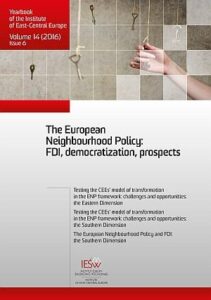ORCID: Tomasz Stępniewski: 0000-0002-4581-5145
Strony: 199-210
Wydanie: Lublin 2016
DOI: --
Sposób cytowania: T. Stępniewski, A. Visvizi, ‘Shifting emphasis of the ENP: is the EaP less ‘sexy’?’, Yearbook of the Institute of East-Central Europe, vol. 14, no. 6, 2016, pp. 199-210.
Słowa kluczowe: East-Central Europe, Eastern Partnership, European Neighbourhood Policy, Russia, Ukraine
Abstrakt:
The ENP is an offspring of the EU’s ambition to manage its relations with countries located in the Southern Mediterranean. In this sense, starting with the Barcelona Process and the ensuing Euro-Mediterranean Partnership, the power of political gravity in the ENP has always pulled this policy framework toward the South. From this perspective, the ability of the governments of Poland and Sweden to successfully promote the idea of the establishment of the Eastern Partnership, meant as a way of re-balancing the ENP’s focus and pre-empting the emergence of a possible power vacuum in the region, deserves particular attention and applaud. To certain extent and in a forward thinking manner, once agreed upon, the EaP became a powerful instrument for the EU to manage its relations with countries beyond its eastern borders. Today, given the developments in the EU’s southern and eastern neighbourhood, the salient question is if the EaP will retain the clout it requires if the EU is to efficiently manage its relations with countries Eastern Europe and in the broadly conceived post-Soviet space. The objective of this paper is outline the key problems and challenges that may protract the EU’s capacity to do that.

PDF: Pobierz